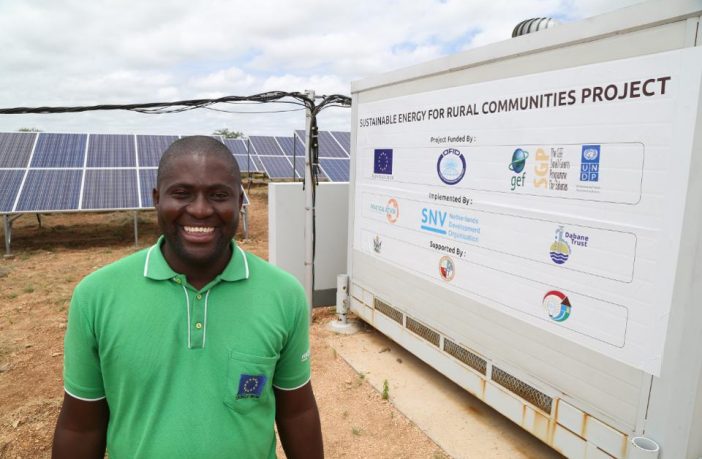- Solar power for watering crops isn’t just a pipe dream.
- In Mashaba, a Zimbabwean village near the town of Gwanda, renewable energy is helping to pump underground water to fields whose farmers previously relied on inconsistent rainfall, or on irrigation using (expensive and hard-to-locate) diesel.

Lydia Ncube shows the crops she has watered through solar-powered irrigation. Credit: David Brazier
Masuka is from Bulawayo, Zimbabwe’s second-largest city. He explains of his current work in rural parts of the country, “my day to day work involves the technical aspects like installation of the solar systems, the transmitter and distribution lines, and also maintenance of the solar system in the electrical network.” It has also involved a lot of community education, from installation and continuing through maintenance. For instance, some residents were understandably cautious about the project because of negative experiences with poor-quality solar products in the past.
The solar system still isn’t flawless. As it’s dependent on the weather, users need backup sources for energy at night. But the solar mini-grids are reported to provide reliable, relatively affordable, and of course environmentally efficient forms of energy.
Masuka previously worked for the conventional power industry, but finds his current role more stimulating. He says, “now with renewable energy, with solar energy, it’s a bit more challenging and interesting. On a daily basis, you are meeting new challenges. You are meeting challenges which you have never experienced before.”Masuka reports that all of the parts can now be repaired locally, though finding replacement parts was initially an obstacle.
Local repairability is an important step forward for the sustainability of the project. Even more important for future durability is local ownership. On June 20, the management of the Mashaba mini-grids and client service was officially handed over to local residents, who were already maintaining the project during Masuka’s absences. The local Community Electricity Supply Company is now officially responsible; this consists of a board of community members, village employees, and representatives of government departments and local authorities.

Kenneth Moyo, a farmer, demonstrates how the irrigation channels work. Credit: David Brazier
Author: Christine Ro
Check out her website.















